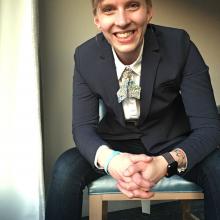Fusion Summit - Part 3: Collaboratively Planning For Change
Concurrent Session 5




Brief Abstract
Participants in this session will engage in collaborative action planning, utilizing a modified template designed for and tested with community during June’s OLC Ideate event. Throughout the session, the facilitators will also report on the major findings / takeaways from this event and the OLC Ideate DEI experience as a whole.
Presenters


Extended Abstract
Marking the third and final session of our multipart Fusion Summit, this interactive session will engage participants in generative and collaborative action planning. The session will begin with a brief overview of what took place during the OLC Ideate DEI experience. OLC Ideate DEI convened two events, in December 2020 and June 2021, committed to identifying critical DEI-centered actions the field of online, digital, and blended learning should take up. In December 2020, the first Ideate OLC DEI welcomed 159 participants, who engaged in a series of live speakers, workshops, asynchronous presentations and discussion forums. Together they created a draft Collaborative Charter to guide our collective actions related to ensuring diversity, equity, and inclusion within digital learning environments.
At the June Action Planning event, a small group of committed OLC community members worked together to generate ideas and actions (based on the community contributions in the Collaborative Charter) to address diversity, equity and inclusion issues within online, digital, and blended learning environments. Over 4 days, groups ideated in 6 distinct areas: Pedagogy, Course Design, Research, Educational Technology, Leadership and Advocacy/Community. Small groups then created action plans drawing from ideas generated during ideation sessions on the first day. Plans outlined Who, What and How for each potential action and were designed to support the operationalization of these actions across communities and institutional contexts.
Out of these gatherings we have collectively identified characteristics of online, digital, blended learning environments that center diversity, equity, and inclusion, and have developed a model for developing, facilitating, and sustaining change and action-oriented communities of practice online.
With these events and the generation of a new, energized community dedicated to action-based change behind them, in this session facilitators will share major findings and highlight key takeaways from the OLC Ideate DEI experience. They will then transition to a collaborative and interactive activity, where participants will engage in action planning together, using a modified version of the same action planning templates used during June’s OLC Ideate event. With other colleagues in attendance during the session, they will generate actionable plans, through reflecting on our field’s challenges and opportunities and considering how to actualize ideas, what other resources exist that can be leveraged, who needs to be involved in this work, and what success will look like. Participants will not only leave with a DEI-centered model for moving from idea into action (whether individually or as a collective), but will be invited to join in on the work to come!
About the Fusion Summit: The success of the field of online, blended and digital learning is bolstered by the dimensions of diversity present across our community, centering practices of sharing and collaboration in support of student success. The Fusion Summit spotlights the diverse thought leadership and visionary actions of prominent voices from the respective communities of Historically Black Colleges and Universities (HBCUs), Hispanic-Serving Institutions (HSIs), Tribal Colleges and Universities (TCUs), and Asian American and Pacific Islander Serving Institutions (AAPISIs), providing guidance and strategic vision for the entire community.
Focusing on the quality characteristics of online learning as well as digital strategies prioritized by these visionaries through their work in online education, this multipart summit uses actionable design practices and collaborative work to create a community of practice supporting work well beyond the conference.


